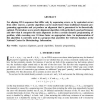Free Online Productivity Tools
i2Speak
i2Symbol
i2OCR
iTex2Img
iWeb2Print
iWeb2Shot
i2Type
iPdf2Split
iPdf2Merge
i2Bopomofo
i2Arabic
i2Style
i2Image
i2PDF
iLatex2Rtf
Sci2ools
109
click to vote
JCB
2000
2000
A Greedy Algorithm for Aligning DNA Sequences
For aligning DNA sequences that differ only by sequencing errors, or by equivalent errors from other sources, a greedy algorithm can be much faster than traditional dynamic programming approaches and yet produce an alignment that is guaranteed to be theoretically optimal. We introduce a new greedy alignment algorithm with particularly good performance and show that it computes the same alignment as does a certain dynamic programming algorithm, while executing over 10 times faster on appropriate data. An implementation of this algorithm is currently used in a program that assembles the UniGene database at the National Center for Biotechnology Information. Key words: sequence alignment, greedy algorithms, dynamic programming.
Related Content
| Added | 18 Dec 2010 |
| Updated | 18 Dec 2010 |
| Type | Journal |
| Year | 2000 |
| Where | JCB |
| Authors | Zheng Zhang 0004, Scott Schwartz, Lukas Wagner, Webb Miller |
Comments (0)

